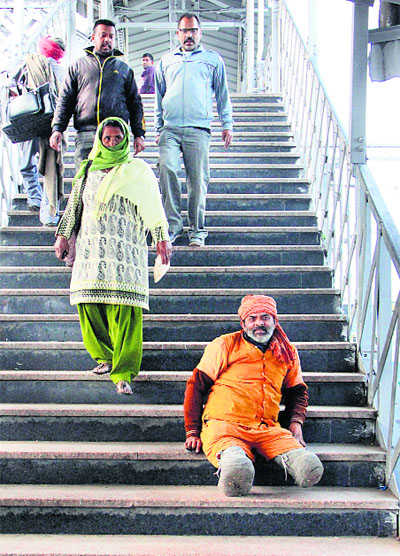
Avinash Shahi
Doctoral candidate, Centre for Law and Governance, JNU
Finance Minister Arun Jaitley's Budget 2018-19 has come as a shock for the disability sector. The increase in the allocation proposed to the Department of Empowerment of Persons with Disabilities (DEPWD) -- from Rs 855 crore last year to Rs 1070 crore this year -- is peanuts. The department was established in 2012 to look after disability affairs in the country. A cursory look at its short stint shows that the department is far behind in achieving its transformative objectives of providing Unique Identity Cards to the disabled, facilitating Accessible India campaign, setting up of regional sports centres for the disabled and establishing the National University of Rehabilitation and Disability Studies proposed in the previous years' budgets. The meagre funds provided to the department and shuffling of officials at short intervals are the main hurdles in the smooth implementation of the projects. Such lackadaisical approach on the part of the government which is bent on imposing the patronising term 'divyang' (divine body') on the disabled is a cause of great concern.
From the perspective of an ordinary person with disability, the performance of the NDA II government over the last four years has been negligible. The Budget 2014, which was the first Budget presented by the Narendra Modi-led NDA government envisaged several schemes for persons with disabilities. It proposed to set up 15 Braille presses, promised to chalk out a roadmap in consultation with the RBI to provide Indian currency with Braille signages and called for the establishment of National Institute of Inclusive and Universal Design.
The Central government, however, has reneged from its commitments. Post November 2016, demonetisation followed by new notes has dealt a huge blow to the blind people, in particular. Owing to similar sizes and shapes, the currency notes of Rs 2000, Rs 500 and Rs 200 notes are difficult to differentiate by touch. Despite several reports highlighting difficulties faced by the blind people, the government and the Reserve Bank of India have remained oblivious to the agony experienced by them. Such indifference compelled organisations working for the disabled to filed public interest litigations (PILs) in the Delhi and Bombay High Courts. The Delhi High Court has sought response from the Centre and the RBI.
After a hard-fought struggle by the disabled people, the NDA II government enacted the Rights of Persons with Disabilities Bill 2016 and the Mental Healthcare Act 2017. The RPDA 2016 recognises 21 types of disabilities. The law mandates four per cent reservation in public employment, five per cent in poverty alleviation schemes and five per cent in government-aided higher educational institutions. It's a sad commentary that in the last 14 months since the law got enacted, none of the 29 states has framed rules to implement the RPD Bill 2016.
It is noteworthy that disability falls under state subjects under the Seventh Schedule of the Constitution. It's a golden opportunity for the BJP and its allies to do justice with the mandate. If they are committed to protecting the substantive rights of the people with disabilities, the time is opportune. The BJP is in power in 19 states. Prime Minister Modi should encourage the state governments to provision higher financial allocation in the forthcoming state budgets to frame rules to implement the RPD Bill 2016 and establish disability departments in the respective states. Recently, the parliamentary committee report on the Department of Empowerment of Persons with Disabilities brought forth some crucial data. Even after 23 years of the erstwhile 1995 legislation on disabilities, only six states have dedicated departments and district social welfare officers to look into issues of disabled persons. This speaks volumes about the importance accorded to the issues faced by people with disabilities by the state governments.
Disability laws were promulgated to protect the rights of the people with disabilities and honour international obligations, but the budget 2018-19 pays merely a lip service towards the needs of 26 million persons with disabilities and their families. Persons with thalassemia, haemophilia, autism, multiple sclerosis, learning disabilities and survivors of acid attacks are now recognised under the Rights of Persons with Disabilities 2016 law. The union budget 2018 offers nothing to these newly included disability groups. India is one of the least accessible countries in the world for the disabled people.
If India is to become a disabled-friendly country in terms of both physical and virtual infrastructure, it is imperative for the central and the state governments to pump schemes for disabled people with sufficient money. The majority of people with disabilities reside in faraway hamlets in rural areas and bringing about a substantive transformation in their lives should be the top priority. The state is duty-bound to protect their rights and provide them dignified livelihood. Given the untouchable treatment meted out to the disabled people in the budget, the call for 'sabka sath sabka vikas' (collective efforts and inclusive growth) sounds superfluous for people with disabilities. The government needs to walk the talk and should ensure that its policies for the empowerment of the disabled are properly implemented at the grassroot level. The Union Budget provides a glimpse into the priorities of the government and this year's budget has been cruel for the disabled people.



























